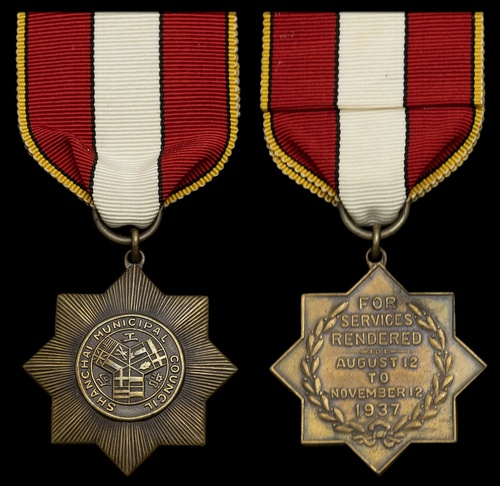
Auction: 25001 - Orders, Decorations and Medals
Lot: 43
Shanghai Municipal Council Emergency Medal 1937, bronze (Sgt. W. W. Graham S.M.P.), engraved between rays, good very fine
William Walter Graham was born on 1 October 1902, son of Herbert and Constance, of 53 Kelmscott Road, Wandsworth. Graham joined the British Army circa 1919 and went to India and thence onto Shanghai. It is assumed he served in the Shanghai Defence Force 1927-28 and joined the Shanghai Municipal Police in 1928 (Constable No. 813). Promoted Sergeant in 1931, he married Alda Madeira and they lived at Embankment Building, overlooking the Soochow Creek - which would offer a good viewpoint for the following troubles.
Graham would have been on active service during the August-November 1937 emergency (Medal) and then took long leave from February-July 1939 with his wife and (by now) two children. Promoted Sub-Inspector (North China Herald, 12 June 1940 refers) and added to the Foreign Affairs Team as part of the Western Area Police Force, things were to take a severe turn.
Following the uncontested invasion of Shanghai by the Japanese on 8 December 1941, life continued comparatively unchanged and the Municipal Police were required to maintain the administration, under the Shanghai Provisional Council of 1941
Under considerable pressure from the United States Administration, the foreign Extra Territorial Treaties, which had established the China Treaty ports in the 19th century including Shanghai (except that for Hong Kong), were abrogated on 11 January 1943 by the Treaty Between His Majesty in Respect of the United Kingdom and India and His Excellency the President of the National Government of the Republic of China for the Relinquishment of Extra-Territorial Rights in China and the Regulation of Related Matters - so that at the end of the Japanese War Shanghai, and other occupied treaty ports would be returned to the Chinese Government (KMT) in Nanking.
This also had the effect of terminating the Police service contacts - in Graham's case on 22 February 1943.
That same month, Graham and other expatriate members of allied countries were put into one of the internment camps - described as Civil Assembly Centres.
The Graham family were interned in the Yu Yuen Road camp which, like Ash Camp, held a large number of former Shanghai Municipal Council employees. Located at 404 Yu Yuen Road, it was composed of the grounds and buildings of the former Western District Public School and the Shanghai Public School for Girls. "G Block", the Girls' School, next to the Fire Station, and "B Block", the Boys' School, and "T Camp" were temporary wooden huts along Tifeng Road , which had been constructed to house British troops during emergencies. Some 972 internees were held at Yu Yuen Road throughout the internment period. Internees were moved near the end of the war to Yangtzepoo, finally being discharged from the Lunghwa Camp in August 1945.
As a result of the British/China treaty of 1943 - at the end of the Pacific War, when the employees of the Municipal Council, civil servants, Police, Fire etc. came out of the internment camps in August and September 1945, they were unemployed. Some managed to obtain jobs in Shanghai and Hong Kong, but the majority returned the their home, which the Grahams did on the Tamaroa on 22 November 1945.
Although compensation was paid by the British Foreign Office to former Council employees covering the loss of their pension rights - Graham received £841 6s 5d being his superannuation funds - that for loss of property continued for years, mostly unsuccessfully.
The family settled in Peterborough where Graham worked for Baker Perkins Ltd, manufacturers of food processing equipment. He died on 12 December 1961.
Subject to 20% VAT on Buyer’s Premium. For more information please view Terms and Conditions for Buyers.
Estimate
£500 to £700
Starting price
£450




